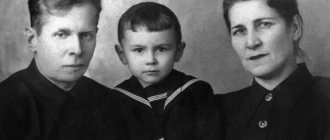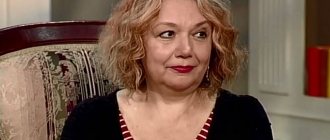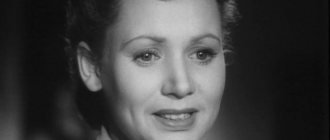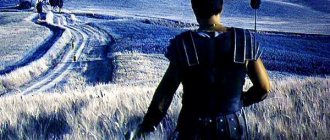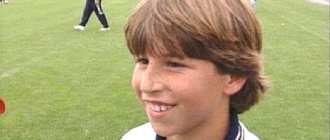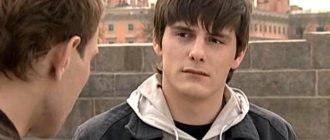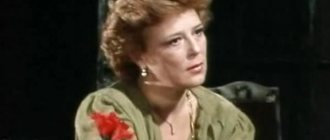What kind of life path did Barto Agnia take? The biography of the beloved poetess, on whose poems several generations of children grew up, arouses the interest of both children who know her poems by heart and parents who raise their children on such familiar lines. The famous “There goes the bull, rocking...”, “Our Tanya is crying loudly...”, “They dropped the teddy bear on the floor...” are associated with the baby’s first steps, the first word “mother,” the first teacher, the first school bell. The style of these favorite lines is very easy, the author speaks to the child as if he were the same age, in a language he understands.
Not everyone knows about the personal tragedy of this bright man, about the important life role that Agnia Lvovna Barto took on, whose biography is closely connected with children. In the post-war years, the famous poetess helped meet thousands of people lost during the war.
Agnia Barto: creativity and biography
For children, Agnia Barto is the very first and favorite writer, whose poems they, having grown up and created families, tell their children. Agnia Lvovna was born on February 4, 1906 in the family of Lev Nikolaevich Volov, a veterinarian. The family led the typical lifestyle of a well-to-do home for those times: with home-based primary education, French language, and formal dinners. The father was in charge of education; being a fan of art, he saw his daughter as a famous ballerina, which Agnia did not become. The girl was interested in a different direction - poetry, which she became interested in following her gymnasium friends.
In 1925, the first books of poems for children were published: “The Chinese Little Wang Li”, “The Thief Bear”. Agnia was very shy and, once deciding to read her poem to Chukovsky, she attributed the authorship to a five-year-old boy. The talented girl finally decided on the topic of poetry after a conversation with Vladimir Mayakovsky, in which he spoke about the need for a fundamentally new children's poetry that could play an important role in the education of a future citizen. Agnia Barto believed that her works would raise highly cultured, patriotic, honest citizens of their country. The biography of Agnia Barto for children is connected with her favorite poems; from the pen of the poetess from 1928 to 1939 the following collections of poems were published: “The Boy on the contrary”, “Brothers”, “Toys”, “Bullfinch”.
Condolences on the death of Agnia Barto
“Agniya Lvovna Barto is not only a recognized poet, but also an excellent citizen. I deeply respect her both for her wonderful children's poems and for the great work she did in search of mothers and children separated from each other by the war, separated from each other by the “guilty without guilt”. For the fact that she was able to answer the cry of the soul, the question of the lives of two people: “Where are you, my son?”, “Where are you, my mother?” With the help of radio, she brought joy to how many people. I know mothers with many children who have fostered and adopted many orphans. But Agnia Lvovna, like a true poetess, adopted thousands and thousands of children. I thank her very much for this.” Rasul Gamzatov, poet
The life of a poetess: creative and personal
Agnia Barto's personal life was not boring; Quite early, she started a family with the poet Pavel Barto and gave birth to a child, a son, Garik.
The first marriage cracked, perhaps due to youthful haste, or perhaps it was due to professional successes that Pavel Barto could not come to terms with. At the age of 29, Agnia left for another man - energy scientist Andrei Vladimirovich Shcheglyaev, who became the main love of her life. From him Agnia gave birth to a daughter, Tatyana. The non-conflict nature of Agnia Barto and the authority of the dean of the power engineering faculty of MPEI (“the most handsome dean of the Soviet Union”) - Andrei Vladimirovich - attracted actors, musicians, and writers to their house. Agnia Barto was very close friends with Rina Zelena and Faina Ranevskaya.
Barto Agnia, whose biography is of interest to older generations who grew up on their favorite poems, traveled quite a lot as part of delegations from the Soviet Union, and in 1937 participated in the International Congress for the Defense of Culture in Spain. It was there that she saw with her own eyes what fascism was, because the meetings took place in a burning, besieged Madrid, and orphaned children wandered among the destroyed houses. The most difficult impression on Agnia was made by a conversation with a Spanish woman, who showed a photograph of her son and covered his head with her finger, thus explaining that the boy had been torn off by a shell. How to convey the feelings of a mother who has outlived her own child? She received an answer to this terrible question several years later.
Biography of Barto
Even in early childhood, Agnia began writing poetry. As the poetess herself later admitted, in the first grades of the gymnasium she paid tribute to love themes: she covered more than one page with naive poetic stories about “marquises and pages in love.”
However, the girl quickly got tired of writing poems about languid beauties and their ardent lovers, and gradually such poems in her notebooks were replaced by bold epigrams for her friends and teachers.
Like all children from intelligent families of those times, Barto studied German and French and went to a prestigious gymnasium. In addition, she entered the choreographic school, intending to become a ballerina. At the same time, the financial situation of the Jewish family, and even in the conditions of the October Revolution, left much to be desired. Therefore, at the age of 15, Agnia forged documents, increasing her age by a year, and became a salesperson in the Clothes store (its employees were given herring heads from which they could cook soup).
Barto Agnia: biography during the war years
Agnia Barto knew about the inevitability of war with Germany. At the end of the 30s, she visited this clean, tidy country, saw pretty curly-haired girls in dresses decorated with swastikas, and heard Nazi slogans sounding on every corner. The war treated the poetess mercifully; Even during the evacuation, she was next to her husband, who was sent to the Urals, namely to Sverdlovsk. According to Agnia Barto, which was soon confirmed by the words of the writer Pavel Bazhov, the Urals were closed, stern and distrustful people. Sverdlovsk teenagers, taking the place of adults who had gone to the front, worked in defense factories.
Agnia simply needed to communicate with children, from whom she drew stories and inspiration. In order to somehow get closer to them, the poetess mastered the profession of a 2nd category turner. Working at a lathe, she diligently proved her usefulness to a society forced into the framework of a brutal war. Agnia Lvovna spoke on radio in Moscow and Sverdlovsk, wrote military articles, essays, and poems. She spent 1942 on the Western Front, being a correspondent for Komsomolskaya Pravda. In the post-war years, she visited England, Bulgaria, Japan, Iceland and a number of other countries.
Creative career
One day, the People's Commissar of Education, Anatoly Lunacharsky, visited the choreographic school where Agnia Barto studied. He came to the school’s graduation tests and, among other things, heard the young poetess, to the accompaniment of Chopin’s music, read out a very impressive poem of her own composition, “Funeral March.”
Although the work was by no means humorous, Lunacharsky could hardly restrain himself from laughing and confidently declared that the girl would write beautiful, cheerful and joyful poetry.
In 1924, Agniya Lvovna completed her studies at the choreographic school and successfully entered the ballet troupe. However, she still failed to build a successful career on stage: the troupe emigrated, and Agnia’s father did not agree to let her leave Moscow.
The poetess brought her first works to Gosizdat in 1925. “The Thief Bear” and “Chinese Little Wang Li” were liked by the publishing house, and the poems were published. This was followed by collections of poems “Toys”, “Brothers”, “Boy on the contrary”, “Bullfinch”, “Chatterbox” and many others.
The works of the young poetess quickly ensured her great popularity among Soviet readers. She was not a fan of fables, but created humorous and satirical images and ridiculed human shortcomings.
Her poems were read not as boring lectures, but as funny teases, and thanks to this they were much closer to children than the works of many other children's poets of the early 20th century.
At the same time, Agnia Lvovna always remained a very modest and shy person. So, she was crazy about Mayakovsky, but at the first meeting with him she did not even dare to open her mouth. However, later a conversation about children's poetry between Barto and Mayakovsky did take place, and Agnia learned a lot from it for her future work.
And when Korney Chukovsky listened to one of Agnia’s poems, she stated that it was written by a five-year-old boy. The conversation with Maxim Gorky was no less exciting for the writer.
Both in her youth and in her more mature years, Agnia Lvovna was distinguished by a kind of linguistic perfectionism. One day she went to a book congress that was held in Brazil. She had to give a report, translated into English. However, Barto repeatedly changed the text of the Russian version of her speech, which almost drove the translator crazy.
During the war years, Agnia Barto and her family were evacuated to Sverdlovsk. She spoke a lot on the radio and published war articles, essays and poems in newspapers. In the 1940s, she came up with the idea of a work about young teenagers who work tirelessly in defense factories at numerous machines. To master the topic, she even mastered the profession of a turner, and in 1943 she wrote the long-awaited work “The Apprentice Is Coming.”
Personal tragedy of Agnia Barto
The poetess returned to Moscow in 1944. Life returned to normal, friends were returning from evacuation, and the children began studying again. Everyone was looking forward to the end of the war. May 4, 1945 was a tragic day for Agnia. On this day, a truck coming around the corner killed 15-year-old Garik, who was riding a bicycle. The Victory Day faded for the mother’s heart, and her child passed away. Having experienced this tragedy hard, Agnia turned all her love to her daughter Tatyana, continuing to persistently engage in creativity.
The 1940-1950s were marked by the release of new collections by Agnia Barto: “Funny Poems”, “First-Grader”, “Poems for Children”, “Zvenigorod”. At the same time, the poetess worked on scripts for children’s films “Alyosha Ptitsyn Develops Character”, “Foundling”, “Elephant and String”. In 1958, a significant cycle of satirical children's poems “Leshenka, Leshenka”, “Grandfather’s Granddaughter” was written.
Film adaptations of works[ | ]
Movies
, based on the scripts of Agnia Barto[19]
- “The Foundling” is a 1939 film produced by the Mosfilm studio.
- “The Elephant and the Rope” is a 1945 film produced by the Soyuzdetfilm studio.
- “Alyosha Ptitsyn Develops Character” is a 1953 film produced by the Lenfilm studio.
- “Ten Thousand Boys” or “10,000 Boys” - 1961 film at the M. Gorky Film Studio
- “From Seven to Twelve” is a 1965 film produced by the Mosfilm studio.
- “Looking for a Man” - 1973 film at the M. Gorky Film Studio
Cartoons
, created based on the poems of Agnia Barto:[20]
- “Two Illustrations” is a two-story puppet cartoon from 1962 (the first story is “The Roaring Girl,” based on the writer’s poem).
- “Bullfinch” is a 1983 hand-drawn cartoon based on the writer’s work of the same name (Soyuzmultfilm).
- “The Magic Shovel” is a 1984 hand-drawn cartoon based on the writer’s poems, produced by Ekran.
- “Tamara and I” is a Russian 2D computer cartoon, a modern interpretation of the writer’s poem. The film participated in the competition program of the Suzdal 2004 festival.
Favorite poet of all generations
Barto Agnia, whose biography is interesting to her fans, thanks to the poems she wrote, became an influential writer, a favorite of the entire Soviet Union, “the face of the Soviet children's book.” In 1947, the poem “Zvenigorod” was published, telling about children who lost their parents during the war. It was written after visiting an orphanage in Zvenigorod, a town near Moscow. This poem, which used conversations with children, was destined for a special share. After the release of Zvenigorod, Agnia Lvovna received a letter from a woman who lost her eight-year-old daughter during the war. The fragments of memories of the children depicted in the poem seemed familiar to the woman, and she consoled herself with the hope that Agnia communicated with her missing daughter. That's exactly what it turned out to be. Relatives met 10 years later.
In 1965, the Mayak radio station began broadcasting the program “Looking for a Man,” hosted by Agnia Barto. The search work was based on childhood memories, which, according to the writer, are so tenacious and sharp that they remain with the child for life. Over 9 years of painstaking work, Agnia Barto managed to connect thousands of human destinies.
In her personal life, everything went well: her husband was successfully moving up the career ladder, Agnia became the grandmother of her wonderful grandson Vladimir, for whom she wrote the poem “Vovka is a kind soul.” The poetess still traveled around the world, was the face of any delegation, because she knew how to behave in society, spoke several languages, danced beautifully and dressed beautifully. The doors of Agnia Barto's house were always open to guests; Academicians, aspiring poets, famous actors and MPEI students gathered at one table.
Agnia Barto - Dirty girl
- Oh, you grimy girl, where did you get your hands so dirty? Black palms; there are tracks on the elbows.
“I was lying in the sun, holding my hands up. SO THEY GOT TUNED. - Oh, you grimy girl, where did you get your nose so dirty? The tip of the nose is black, as if smoked.
“I was lying in the sun, holding my nose up. SO HE GOT TUNED. - Oh, you, a grimacing girl, smeared her legs in strips, not a girl, but a zebra, legs, like a black man.
“I was lying in the sun, holding my heels up. SO THEY GOT TUNED.
- Oh, really? Was that really the case? Let's wash everything down to the last drop. Come on, give me some soap. WE WILL RUSH IT AWAY.
The girl screamed loudly when she saw the washcloth, clawed at her like a cat: “Don’t touch your palms!” They will not be white: they are tanned. AND THEIR PALM HAS BEEN WASHED.
They wiped their nose with a sponge - she was upset to the point of tears: - Oh, my poor nose! He can't stand soap! He won't be white: he's tanned. AND THE NOSE WAS ALSO WASHED.
While washing the stripes, she screamed in a loud voice: “Oh, I’m afraid of tickling!” Put away the brushes! The heels will not be white, they are tanned. AND THE HEELS WERE ALSO WASHED.
- Now you are white, not at all tanned. IT WAS DIRT.
The last years of Agnia Barto
In 1970, Andrei Vladimirovich, Agnia Barto’s husband, whom she outlived by 11 years, died of cancer. All these years, Agnia Lvovna worked tirelessly, wrote 2 books of memoirs, more than a hundred poems. Fearing loneliness, she could talk on the phone for hours with her friends, and tried to see her daughter and grandchildren often. She is remembered with gratitude by the families of her repressed acquaintances, for whom Agnia Lvovna found good doctors, helped them get scarce medicines, and “opened up” apartments - even for strangers.
Agnia Barto died in Moscow in 1981, on April 1. Having performed an autopsy, the doctors were shocked by the very weak vessels and did not understand how blood had flowed into the heart of such a bright person in the last 10 years. A short biography of Agnia Barto covers the key moments of her life, difficult and fruitful; We still read her poems, raise our children with them, and raise our grandchildren.
Barto A. L. Biography
Barto Agnia Lvovna Russian poetess
(real name Volova)
Agnia Barto was born on February 4 (17), 1906 in Moscow in the family of a veterinarian. She received a good home education, led by her father. She studied at the gymnasium, where, experiencing the creative influence of A.A. Akhmatova and V.V. Mayakovsky, began writing poetic epigrams and sketches. At the same time, she studied at the choreographic school, where A. Lunacharsky came for graduation tests and, after listening to Barto’s poems, advised her to continue writing.
In 1925, her first poems, “The Chinese Little Wang Li” and “The Thief Bear,” were published. They were followed by “The First of May” (1926), “Brothers” (1928), after the publication of which, K.I. Chukovsky noted Barto's as a children's poet. Some poems were written together with her husband, poet P.N. Barto (“The Dirty Girl” and “The Roaring Girl”, 1930).
After the publication of the cycle of poetic miniatures for the little ones “Toys” (1936), as well as the poems “Flashlight”, “Mashenka”, etc. Barto became one of the most famous and beloved children's poets by readers, her works were published in huge editions, included in anthologies. The rhythm, rhymes, images and plots of these poems turned out to be close and understandable to millions of children.
Agnia Barto wrote the scripts for the films “The Foundling” (1940, jointly with actress Rina Zelena), “Alyosha Ptitsyn Develops Character” (1953), “10,000 Boys” (1962, jointly with I. Okada). Her poem “Rope” was taken by director I. Frez as the basis for the concept of the film “The Elephant and the Rope” (1945).
During the Great Patriotic War, Barto was evacuated in Sverdlovsk, went to the front to read her poems, spoke on the radio, and wrote for newspapers. Her poems of the war years (the collection “Teenagers”, 1943, the poem “Nikita”, 1945, etc.) are mainly journalistic in nature. For the collection “Poems for Children” (1949) Agnia Barto was awarded the State Prize (1950).
Barto’s poem “Zvenigorod” (1948) tells about the children of the orphanage. For nine years, Barto hosted the radio program “Find a Person,” in which she searched for people separated by the war. With its help, about 1,000 families were reunited. Barto wrote the story “Find a Person” about this work (published in 1968).
In “Notes of a Children's Poet” (1976), the poetess formulated her poetic and human credo: “Children need the whole range of feelings that give rise to humanity.” Numerous trips to different countries led her to the idea of the richness of the inner world of a child of any nationality. This idea was confirmed by the poetry collection “Translations from Children’s” (1977), in which Barto translated children’s poems from different languages.
For many years, Barto headed the Association of Children's Literature and Art Workers and was a member of the international Andersen jury. In 1976 she was awarded the International Prize. H.K. Andersen. Barto's poems have been translated into many languages of the world.
Agnia Barto died in Moscow on April 1, 1981
Barto. Poems for children
Agnia Barto - Today the cranes have flown away
Today the cranes flew away at a dank and foggy dawn. For a long, long time the sad and guttural conversation faded away in the distance.
Dull gilding dripped from the stocky, wet birches; the horizon was smooth and white, as if someone had wiped the colors from the sky.
Quiet rain oozed endlessly from this empty space... I remembered my father’s story about the forests and swamps of Augustov.
Haven't heard anything from you. Maybe the letter disappeared on the way, maybe... But I don’t have the right to think about trouble.
Today the cranes flew away... It was very sad to see them off. It's autumn again. Three have already passed... I covered the girl warmer.
A shiver pierced my bones, dampness crept into the cracks of the windows... You will come, of course, you will come to this house where our child grew up.
And you will tell your daughter about what happened during the war, about your life as a soldier, as my father once told me.

